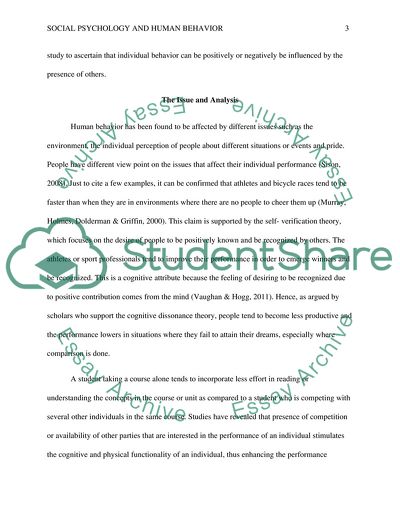Cite this document
(Social Psychology and Human Behavior Essay Example | Topics and Well Written Essays - 1500 words - 1, n.d.)
Social Psychology and Human Behavior Essay Example | Topics and Well Written Essays - 1500 words - 1. https://studentshare.org/psychology/1857857-why-does-the-presence-of-others-improve-individual-performance-in-some-situations-but-inhibit-it-in-others-discuss-in-relation-to-theories-of-social-facilitation
Social Psychology and Human Behavior Essay Example | Topics and Well Written Essays - 1500 words - 1. https://studentshare.org/psychology/1857857-why-does-the-presence-of-others-improve-individual-performance-in-some-situations-but-inhibit-it-in-others-discuss-in-relation-to-theories-of-social-facilitation
(Social Psychology and Human Behavior Essay Example | Topics and Well Written Essays - 1500 Words - 1)
Social Psychology and Human Behavior Essay Example | Topics and Well Written Essays - 1500 Words - 1. https://studentshare.org/psychology/1857857-why-does-the-presence-of-others-improve-individual-performance-in-some-situations-but-inhibit-it-in-others-discuss-in-relation-to-theories-of-social-facilitation.
Social Psychology and Human Behavior Essay Example | Topics and Well Written Essays - 1500 Words - 1. https://studentshare.org/psychology/1857857-why-does-the-presence-of-others-improve-individual-performance-in-some-situations-but-inhibit-it-in-others-discuss-in-relation-to-theories-of-social-facilitation.
“Social Psychology and Human Behavior Essay Example | Topics and Well Written Essays - 1500 Words - 1”. https://studentshare.org/psychology/1857857-why-does-the-presence-of-others-improve-individual-performance-in-some-situations-but-inhibit-it-in-others-discuss-in-relation-to-theories-of-social-facilitation.


